|
Summary: A coronal mass ejection
swept
past
our planet on Oct 21st at 1645 UT and ignited a geomagnetic
storm. The interplanetary
magnetic field
near Earth tilted south -- a condition that encourages geomagnetic
activity -- and, as a result, the storm persisted for nearly 36 hours.
[more]
Unless
otherwise stated, all images are copyrighted by the photographers.
|
|
Photographer, Location |
Images |
Comments |
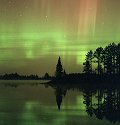 |
Chris VenHaus,
Waukesha, Wisconsin, USA
Oct. 22 |
#1,
#2, #3,
#4, more |
C. VenHaus: "I used Fuji Provia 400F and
Fuji Superia 800 film, and shot these betwen 3:00 and 6:00 am
local time. It was one of the best displays
I've ever seen." |
 |
Tom Eklund,
Valkeakoski, Finland
Oct. 22 |
#1,
#2, #3,
#4, #5,
#6, #7,
more |
T. Eklund: "This was the most lively big
display that I have ever seen!" Photo details: 28mm f/2.0,
15 sec. and Fuji Provia 400F |
 |
Duane
Clausen, Menominee, MI, USA
Oct. 22 |
#1,
#2, #3,
#4, #5,
#6, more |
D. Clausen:
"The northern lights were subdued at first by encroaching
cloud cover. Shortly after dark the haze began to clear and the
clouds broke long enough to allow the aurora to center stage.
" Photo details: Kodak Royal Gold 200, 28mm Lens, 10-15
seconds, f1.8 |
 |
Tony Henderson,
Kadina, South Australia
Oct. 22 |
#1 |
T. Henderson spotted this rare Aurora Australis
from latitude 34S "commencing at 8:20pm local time (Oct
22.45 UT) until clouds and rain spoiled the view around 9pm local
time (Oct 22.48UT)." Photo details: Kodak 400 film, 40mm
F/1.8 lens, 50 second exposure. |
 |
Lyndon Anderson,
near Bismarck, ND, USA
Oct. 22 |
#1,
#2, #3,
#4, more |
L. Anderson: "These are from the night of
October 22 - when I think a lot of us thought the show would
be over. However, I saw a very beautiful show - one I'm glad
that I didn't miss." |
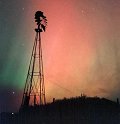 |
Lyndon Anderson,
near Bismarck, ND, USA
Oct. 21 |
#1,
#2, #3,
#4, #5,
more |
L. Anderson: "Two of the photos (#3
and #4) were taken
at 7:45 p.m. while there was still sunlight in the sky. Visually,
this was the prettiest scene. The photos don't [do it justice],
however." |
 |
Ronnie
Sherrill, Troutman, NC, USA
Oct. 21 |
#1,
#2, #3,
#4, #5,
#6 |
The auroras in North Carolina were so bright
that R. Sherrill first saw them at 7:30 pm -- not long after
sunset. By 10:30 pm the sky had "exploded into bright red
with yellowish beams. What an awesome display!" says Sherrill.
Details: 28mm f 3.5, 30 secs., Kodak 400 film |
 |
Alex
Roca & Angels Escuer, Hortoneda, Lerida, Spain
Oct. 21 |
#1 |
This picture is extraordinary because the observers
were at a very low magnetic latitude -- only 34 degrees north!
Photo details: FUJI Superia 200 film, f 3.5, 35 mm, 30 sec exp. |
 |
Hiroyuki
Tsuda, Rikubetsu, Hokkaido, Japan
Oct. 21 |
#1, more |
Photo details: Minolta a7700 camera, 24mm lens
@ f/2.8, 300 sec exp on Kodak 400 film. |
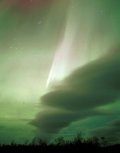 |
John Russell,
Nome, Alaska USA
Oct. 22 |
#1,
#2, #3,
more |
J. Russell: "Nome was completely overcast
all day. However at about 03:00 a.m. the clouds eased just a
bit for a few minutes. I could see bright shades of green and
nice patterns, but little colors otherwise. I could even see
little Nome's light pollution carried by the haze, from almost
15 miles away. " Photo details: Nikkor 28mm @ f1.4, 10 to
13 seconds on Portra 800 film |
 |
Stan
Richard, central Iowa, USA
Oct. 22 |
#1,
#2, #3,
#4, #5,
#6 |
S. Richard: "An incredible light show in
central Iowa last nite! This is a small sample of the 60 shots
I too." Photo details: Minolta SR-T101 camera, 28mm lens
@ f/2.5, 20-30 sec exp on Fuji Superia 800 and Fuji NPZ 800. |
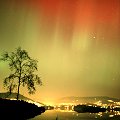 |
Roar
Inge Hansen, near Bergen, Norway
Oct. 21 |
#1,
#2, #3,
#4, #5 |
R. I. Hansen: "Yesterday's auroras were
the most beautiful I have ever seen. They were located almost
directly overhead." Photo details: Camera: Nikon FE, 28
mm f/2.8. Film: Fujichrome Provia 400F. Exposure time: 20-50
sec. |
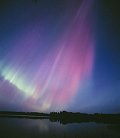 |
Juha
Kinnunen, near Jyväskylä, in central Finland
Oct. 22 |
#1,
#2, #3,
#4 |
J. Kinnunen: "The aurora became visible
at 19.00 local time (16 UT), when the evening sky was still light
blue. A dark red corona and strong, intense rays emerged at local
midnight, lasting for almost an hour." Photo details: Nikkor
14mm/f2.8 and 28mm/f1.4, and Fuji Provia 400F. |
 |
Dominic
Cantin, Quebec, Canada
Oct. 22 |
#1,
#2, #3,
more |
Photo details: 28 mm @ f 2.8, 25 sec exp., Fuji
Superia 800 X-TRA. |
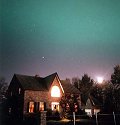 |
Todd Carlson,
Uxbridge, ON, Canada
Oct. 21 |
#1,
#2, #3,
#4, #5 |
T. Carlson: "The shot of my
neighbor's grey house is facing due south into the lights
of Toronto (note the Moon and Mars are in the photo, too). I
was amazed by the fact that the auroras could be seen that well
to the south of me." Photo details: 28mm, f2.8 for approximately
25 seconds, 800 film. |
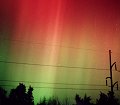 |
Joe Polizzi,
West Bend, WI, USA
Oct. 22 |
#1 |
J. Polizzi: "The camera used was a Yashica
Electro35 (seventies vintage) -- 8 sec. exposure at f2, Fuji
800 film. This is the best Aurora seen around here (NOT obscured
by clouds, that is) in quite a while." |
 |
Michel
Benvenuto, L'Escarene, near Nice, France
Oct. 21 |
#1,
#2, #3,
#4, #5,
#6, #7 |
M. Benvenuto of the Astro Biniou Club: "To
be noted is a greenish knot on the first picture, which I had
seen in Iceland last winter without being able to catch on the
film, and here it is now with some red underneath ." Photo
details: 17mm at f/d 3.5 lens on Kodak Gold 1000. 10 to 20 min
exp. |
 |
Judit Fabian,
Malletts Bay in Colchester, VT, USA
Oct. 22 |
#1,
#2, #3 |
J. Fabian: "When I looked out my window,
the whole sky seemed to be red and green. [It was] the most intense
display I have seen." Photo details: Canon EOS Elan 7, 19mm
f/3.5 15-30 sec and 28 mm f/2.8 10-20 sec on Kodak
Portra 300 film |
 |
Jesús
Ojeda, near St. Francis, WI, USA
Oct. 22 |
#1, #2, #3,
#4, #5,
#6, #7,
#8, more |
J. Ojeda: "The best display I have ever
seen!" Photo details: Nikon N80 camera, 28mm lens, f-stop
3.5, Fuji Superia 800 film, 15-30 second exposures |
 |
Donatas
Narbutis, Vilnius, Lithuania
Oct. 23 |
#1, |
D.Narbutis: "I captured my first picture
of auroras at midnight from Vilnius city. The view was incredible!
I was astonished by the dynamics of the display -- everything
was constantly changing." Photo details: Fuji Superia 800,
58mm Lens, 60 seconds, f2. |
 |
Robert
Smith, near Stoneville, NC, USA
Oct. 21 |
#1, #2, #3,
#4, #5,
more |
Photo details: Lens: 28mm 2.8. Film: Fujicolor
Super HQ 200 |
 |
Debbie
Kinloch and Mike Csorbay, near York, Ontario, Canada
Oct. 21 |
#1,
#2, #3,
#4, #5,
more |
D. Kinloch: "It was pretty foggy here in
Southern Ontario, but the auroral display shone brightly through
and even illuminated the fog. All photos 20-30 sec. Nikon FE.
#1:15mm f3.5 Fuji Superia 800, #2, #3, #4: Kodak Max 400, #5
28mm f3.5 Kodak Gold 200." |
 |
Colin
Tyler Bogucki, near Forest Lake, Minnesota, USA
Oct. 21 |
#1,
#2, #3,
more |
C. T. Bogucki captured these vivid images at
9:30pm local time. |
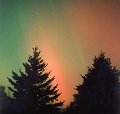 |
Garth Arsenault,
Charlottetown, Prince Edward Island, Canada
Oct. 21 |
#1,
#2, #3,
#4, #5,
more |
G. Arsenault: "[I captured these] using
my Canon AV-1 with a 28mm lens at f2.8 for 20-40 seconds and
using Kodak 400 ASA Max film." |
 |
Ryan Kramer,
near Grand Forks, North Dakota, USA
Oct. 21 |
#1,
#2, #3,
#4 |
R. Kramer: "The auroras were probably the
most spectacular I have ever witnessed, it was like being under
a giant canopy, aurora could be seen in the entire sky, including
directly above and even within 30 degrees of the southern horizon."
Photo details: Canon Rebel G camera, Kodak 400 ASA film |
 |
Jouni
Jussila, Oulu, Finland
Oct. 21 |
#1,
#2, #3,
#4, #5,
more |
J. Jussila: "Some of the red emissions were
extremely bright with lots of structure. Totally beautiful!"
Photo details: Canon EOS 5, Canon EF 24mm F/1.4 and Fuji Provia
400F film. |
 |
Lionel
Bernardi, L'Escarene, near Nice, France
Oct. 21 |
#1,
#2, #3,
#4, #5,
#6, #7,
#8 |
Says Michel Benvenuto of the Astro Biniou Club,
who saw the show with Bernardi: "This was the brightest
aurora I've ever seen at our latitude (44 deg. N)! Pulsating
red and pink columns rose from the ground and some green could
be seen on the horizon." |
 |
Peter
Vonbagh, Lake Saimaa, Finland
Oct. 21 |
#1,
#2 |
P. Vonbagh: "I was waiting for the Orionids,
which didn't come, but instead I got a nice diffuse aurora show
about 3 hours after local midnight." |
 |
Mark Vornhusen,
near Erding, Germany
Oct. 21-22 |
#1,
#2, #3,
#4, #5,
#6, #7,
#8, #9,
#10 |
The auroras were so bright in Germany that photographer
Mark Vornhusen saw them through the clouds. Photos #1 - #8 were
recorded on Oct. 21st. #9 and #10 are from Oct. 22nd. |
 |
Denis
Joye, near Paris, France
Oct. 21 |
#1 |
D. Joye captured this image of red auroras 30
km west of Paris at 23:20 local time using a EPSON PC3000Z digital
camera with an 8 sec. exposure. |
 |
David Zelden,
Thornhill, Ontario, Canada
Oct.21 |
#1,
#2, #3,
#4 |
D. Zelden: "At one point the entire northern
horizon was ablaze in an eerie red and green curtain." Photo
details: Canon EOS camera with 50mm lens, Konica 800 ASA film.
Exposure time: 25 seconds. |
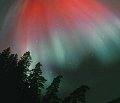 |
Timo Leponiemi,
Hyvinkää,
Finland
Oct.22/23 |
#1,
#2, #3,
more |
T. Leponiemi: "I noticed the northern lights
at 7.30 P.M. local time. The display lasted all night. Red colors
were intense." Photo details: Nikon FG and EM, Nikkor Fisheye
16 mm/f2.8 and Sigma 28mm/f1.8, Kodak Elitechrome 100 pushed
to 2 stops to 400 ASA, appr. 50 sec. exposure time on Fisheye/
appr. 30 sec on 28 mm Sigma. |
 |
Sébastien
Giguère, Mount Megantic Park, Quebec, Canada
Oct. 23 |
#1,
#2 |
S. Giguère: "These two pictures were
taken while the storm was subsiding. They are not the most spectacular
shots, but the view was very nice. " Photo details: Nikon
Coolpix 995 |
See
also our Oct 11-12, 2001, aurora gallery!
More information: The CME that hit Earth on Oct 21st left
the Sun two days earlier. On Oct. 19th, when twisted magnetic
fields above sunspot 9661 erupted powerfully -- not once, but
twice -- at 0105 UT and again at 1635 UT. Both explosions unleashed
category X1.6 solar flares and hurled
lopsided coronal mass ejections (CMEs) toward Earth. The
first of the expanding clouds hit Earth's magnetosphere on Oct. 21st at 1650
UT; the
second
may have arrived on Oct. 22nd -- unnoticed amid the ongoing geomagnetic
storm.
back
to spaceweather.com |
































